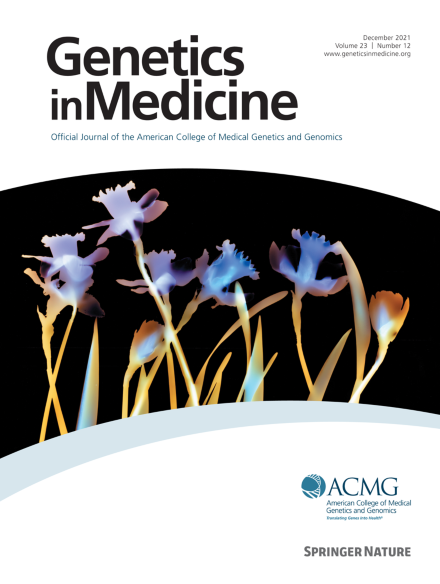基于人口的测序基因组咨询模式:事后干预研究
IF 6.6
1区 医学
Q1 GENETICS & HEREDITY
引用次数: 0
摘要
背景:基因组测序(GS)的新用途为将测序结果返还给健康个体提供了机会,促使人们需要可扩展的遗传咨询策略。我们评估了基因组咨询模型(GCM)的有效性,并探讨了普通人群对 GS 结果的偏好:方法:参与者(N=466)完成了 GS 和我们的 GCM(数字基因组学平台和基于小组的网络研讨会),并表明了对结果的偏好。调查在 GCM 前(T0)和后(T1)进行。使用配对样本 T 检验和 Wilcoxon 检验评估了知识和决策冲突 (DC) 的变化。使用线性和逻辑回归模型评估了影响知识和结果偏好的因素:结果:56%的参与者为女性,58%为白人,53%年龄≥40岁。平均知识得分有所提高(局限性:3.73 至 5.63 分;不确定性:3.73 至 5.63 分):限制:3.73 分至 5.63 分;益处:3.73 分至 5.48 分:P结论:在对学习 GS 研究结果感兴趣的接受 GS 的人群中,我们的 GCM 增加了知识,减少了 DC,说明了 GCM 在普通人群中进行 GS 咨询的潜在有效性。本文章由计算机程序翻译,如有差异,请以英文原文为准。
A Genomic Counseling Model for Population-Based Sequencing: A Pre-Post Intervention Study
Purpose
Novel uses of genome sequencing (GS) present an opportunity for return of results to healthy individuals, prompting the need for scalable genetic counseling strategies. We evaluate the effectiveness of a genomic counseling model (GCM) and explore preferences for GS findings in the general population.
Methods
Participants (N = 466) completed GS and our GCM (digital genomics platform and group-based webinar) and indicated results preferences. Surveys were administered before (T0) and after (T1) GCM. Change in knowledge and decisional conflict (DC) were evaluated using paired-sample T and Wilcoxon tests. Factors influencing knowledge and results preferences were evaluated using linear and logistic regression models.
Results
Participants were 56% female, 58% white, and 53% ≥40 years of age. Mean knowledge scores increased (Limitations: 3.73 to 5.63; Benefits: 4.34 to 5.48, P < .0001), and DC decreased (−21.9, P < .0001) at T1 versus T0. Eighty-six percent of participants wished to learn all GS findings at T1 vs 78% at T0 (P < .0001). Older age, negative/mixed attitudes toward genetics and greater DC were associated with change in preferences after intervention.
Conclusion
In a population-based cohort undergoing GS interested in learning GS findings, our GCM increased knowledge and reduced DC, illustrating the GCM’s potential effectiveness for GS counseling in the general population.
求助全文
通过发布文献求助,成功后即可免费获取论文全文。
去求助
来源期刊

Genetics in Medicine
医学-遗传学
CiteScore
15.20
自引率
6.80%
发文量
857
审稿时长
1.3 weeks
期刊介绍:
Genetics in Medicine (GIM) is the official journal of the American College of Medical Genetics and Genomics. The journal''s mission is to enhance the knowledge, understanding, and practice of medical genetics and genomics through publications in clinical and laboratory genetics and genomics, including ethical, legal, and social issues as well as public health.
GIM encourages research that combats racism, includes diverse populations and is written by authors from diverse and underrepresented backgrounds.
 求助内容:
求助内容: 应助结果提醒方式:
应助结果提醒方式:


